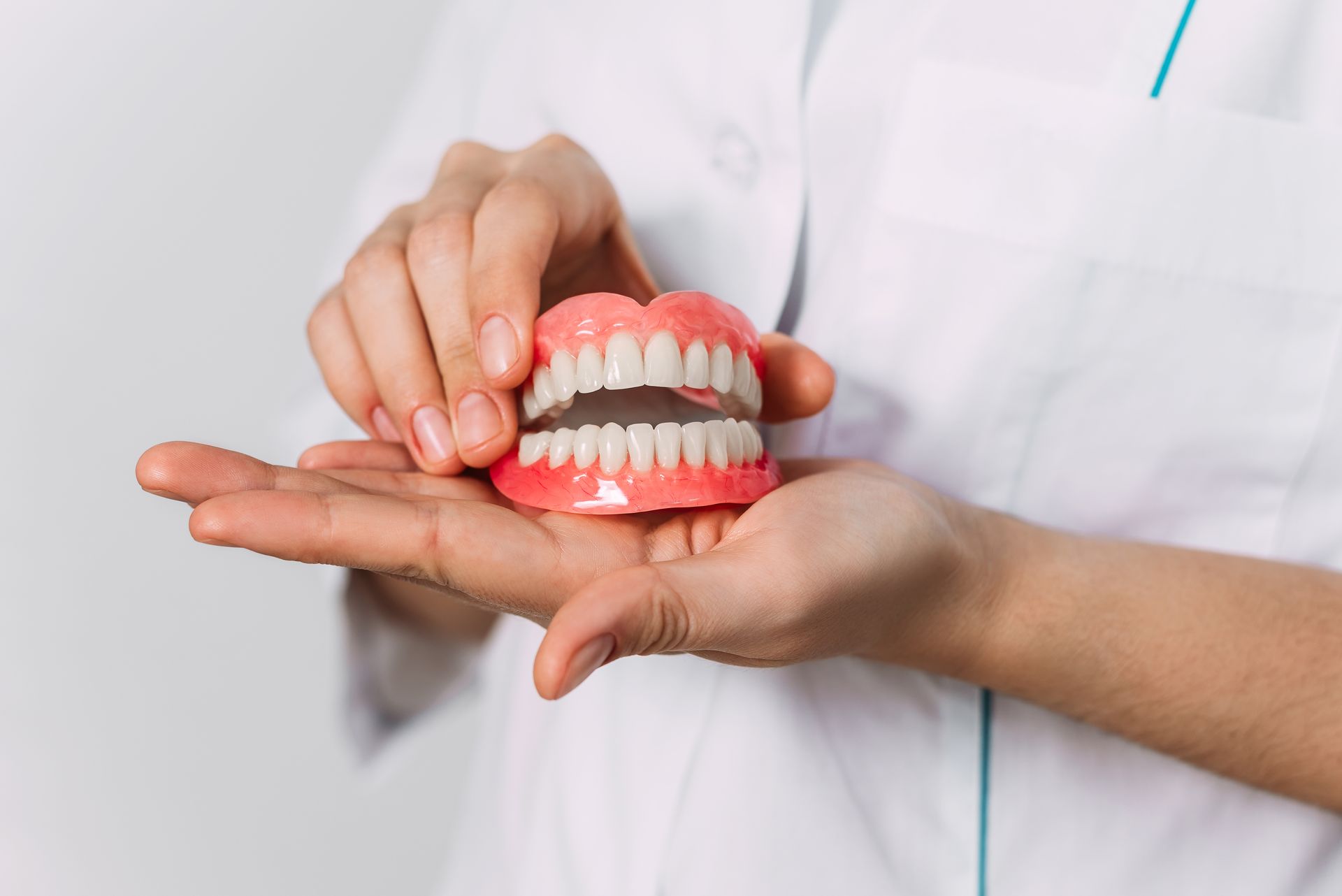Zirconia Dental Implants vs. Titanium
Understanding Dental Implants and Their Materials
Dental implants serve as a long-term solution if you need a tooth replacement. The dentist inserts a small rod into your jawbone while an abutment and crown sit on top to mimic your natural teeth. This guide focuses on what it means to have zirconia dental implants vs. titanium implants since dentists use both materials during this procedure. Ceramic implants, particularly zirconia, offer increased biocompatibility, aesthetic advantages, and reduced inflammation, making them a favorable choice for patients seeking non-metal options in dental implantology.
Explore some of the key differences between each implant material as well as their pros and cons below.
What are Zirconia Dental Implants?
Zirconia dental implants are a cutting-edge solution for replacing missing teeth, crafted from high-quality zirconia ceramic material. Unlike traditional titanium implants, zirconia implants offer a metal-free alternative that is both biocompatible and aesthetically pleasing. These implants are meticulously designed using advanced CAD/CAM technology, ensuring a perfect fit tailored to each patient’s unique dental needs. Made from a monolithic block of zirconia, these implants provide a natural-looking appearance that blends seamlessly with your existing teeth. Their non-toxic nature and low risk of bacterial formation make zirconia dental implants an increasingly popular choice for those seeking a durable and visually appealing solution to tooth loss.
How Titanium Dental Implants Work
Titanium implants feature an implant post and abutment featuring sturdy metal. Titanium alloys are widely utilized in dental implants due to their strengths in osseointegration and biocompatibility. Titanium has a long history of use in various dental procedures because of its durability and non-corrosive properties. Standard dental implants use titanium and end up serving patients for several years before they need a replacement.
Innovative Zirconia Dental Implants
While titanium implants have been in use for several decades, zirconia implants are now becoming more popular after receiving approval from the FDA. One of the biggest talking points when discussing zirconia dental implants vs. titanium is the biocompatibility of each one for various patients. Titanium might be a suitable choice for many patients, but those with rare metal allergies will need an alternative option. Zirconium dental implants are known for their biocompatibility and tissue-friendly properties, making them an excellent choice for patients with metal sensitivities.
Zirconia derives from the metal zirconium. When you combine this element with oxygen, it forms a ceramic material called zirconium dioxide, which is what dentists use for implants. This metal-free option for dental implants has several benefits for patients who might have sensitivity or allergic reactions to titanium implants.
Biocompatibility and Osseointegration
One of the standout features of zirconia dental implants is their exceptional biocompatibility, which plays a crucial role in the process of osseointegration. This process involves the implant fusing with the surrounding bone tissue, creating a stable and secure foundation for the dental prosthetic. Zirconia’s biocompatible properties allow it to integrate seamlessly with the jawbone, promoting healthy bone growth and density. Studies have demonstrated that zirconia implants boast a high success rate and are less likely to cause adverse reactions or complications compared to other materials. This makes zirconia implants an excellent choice for patients looking for a reliable and long-lasting dental solution.
Strength and Durability
When it comes to strength and durability, zirconia dental implants stand out as a robust option. Made from a ceramic material known for its resistance to corrosion and wear, zirconia implants are designed to endure the daily forces of biting and chewing. This high strength reduces the risk of fractures or breaks, ensuring a long-lasting solution for patients. The durability of zirconia implants means fewer complications and a lower likelihood of needing additional surgeries. For those seeking to restore their natural smile and chewing function, zirconia dental implants offer a dependable and resilient choice.
Zirconia vs. Titanium Dental Implants
Both implant materials are non-toxic and generally safe for use. However, metal implants, particularly titanium, have some downsides. Small traces of the material may seep into a patient’s bloodstream over time, potentially causing metal allergies and inflammation. The design of the implant uses three separate parts:
- Metal implant post
- Porcelain or zirconia crown
- Metal abutment
Titanium implant abutments are known for their reliability and durability, making them the industry standard for dental implants, especially in clinical scenarios involving tooth loss due to accidents or disease.
Compared to titanium implants, zirconia and titanium implants have distinct biomechanical properties and primary stability. Zirconia implants are easier to insert because they’re smaller and come in one single piece with the crown and abutment. Perhaps the biggest advantage of using zirconia implants is that the material is compatible with the human body and won’t seep into your bloodstream. Some people report site sensitivity or inflammation with titanium implants, while metal-free alternatives don’t cause any adverse reactions.
Safety and Risks
While zirconia dental implants are generally considered safe and effective, it’s important to be aware of potential risks and complications. These can include implant failure, nerve damage, and infection. However, these risks are significantly minimized when the procedure is performed by an experienced and qualified dentist or oral surgeon. Choosing a professional with a proven track record in implant placements is crucial. Additionally, following proper aftercare instructions and attending regular follow-up appointments are essential steps to ensure the long-term success of your zirconia dental implants. By taking these precautions, patients can enjoy the benefits of a safe and effective dental solution.
Cost and Affordability
The cost of zirconia dental implants can vary based on several factors, including the location of the dental practice, the dentist’s expertise, and the specific needs of the patient. Generally, zirconia implants tend to be more expensive than traditional titanium implants. This higher cost is attributed to the advanced technology and high-quality materials used in their creation, as well as the specialized training required for their placement. Despite the higher initial investment, many patients find that the benefits of zirconia implants—such as their natural appearance, biocompatibility, and durability—make them a worthwhile investment in their oral health and overall well-being.
Longevity of Zirconia Dental Implants vs. Titanium
Research shows that titanium dental implants can last up to 20 years or longer with proper care and maintenance. If you’re looking for a long-term solution, you can’t go wrong with a traditional titanium implant. You’ll be able to smile with confidence knowing that the implant is built to last.
Zirconium implants, on the other hand, have shown promising results in terms of primary stability and performance metrics when compared to titanium implants. Studies analyzing insertion torque (IT) and resonance frequency analysis (RFA) have highlighted statistically significant differences in favor of zirconium implants in certain cases.
This doesn’t mean that zirconia implants won’t serve you for just as long. There simply isn’t enough research at this time since metal-free dental implants are still new to the industry.
Aesthetic Differences Between Titanium and Zirconia Dental Implants
Depending on the location of your implant, you might be able to see the dark titanium rod through your gums. This can be noticeable and distracting, especially if you're self-conscious about having an implant. Zirconia is white and harder to see through the gums.
If you're debating getting zirconia dental implants vs. titanium implants and have concerns about the aesthetic, dentists agree that the ceramic option is your best bet.
Evaluating the Durability of Traditional and Metal-Free Dental Implants
One of the biggest advantages of standard titanium implants is the strength of the metal. Titanium resists corrosion and stands out for being both lightweight and durable. Patients who can't receive a metal implant have a greater chance of damaging their implant material.
Since zirconia is ceramic, it breaks more easily compared to titanium. If this happens to you, you'll have to undergo additional surgery to repair the implant. Make sure that you avoid biting on hard objects and care for your implant regardless of the material implants can last up to 20 years or longer with proper care and maintenance. If you're looking for a long-term solution, you can't go wrong with a traditional titanium implant. You'll be able to smile with confidence knowing that the implant is built to last.
This doesn't mean that zirconia implants won't serve you for just as long. There simply isn't enough research at this time since metal-free dental implants are still new to the industry.
Aesthetic Differences Between Titanium and Zirconia Dental Implants
Depending on the location of your implant, you might be able to see the dark titanium rod through your gums. This can be noticeable and distracting, especially if you're self-conscious about having an implant. Zirconia is white and harder to see through the gums.
If you're debating getting zirconia dental implants vs. titanium implants and have concerns about the aesthetic, dentists agree that the ceramic option is your best bet.
Evaluating the Durability of Traditional and Metal-Free Dental Implants
One of the biggest advantages of standard titanium implants is the strength of the metal. Titanium resists corrosion and stands out for being both lightweight and durable. Patients who can't receive a metal implant have a greater chance of damaging their implant material.
Since zirconia is ceramic, it breaks more easily compared to titanium. If this happens to you, you'll have to undergo additional surgery to repair the implant. Make sure that you avoid biting on hard objects and care for your implant regardless of the material it uses.
Restore Your Smile at Innate Dental Solutions
Now that you know the basics of zirconia dental implants vs. titanium implants, you can make an informed decision about which one is best for you. Reach out to the experts at Innate Dental Solutions today at (972) 519-0990 to schedule an appointment to discuss getting dental implants.
Frequently Asked Questions
Researching zirconia dental implants vs. titanium often leads people to have questions. Discover the answers to some commonly asked questions below.




